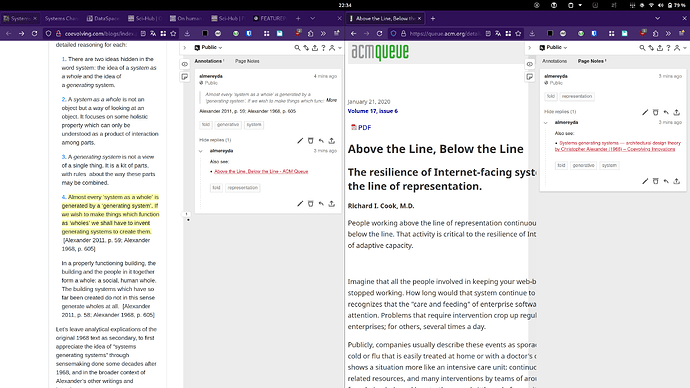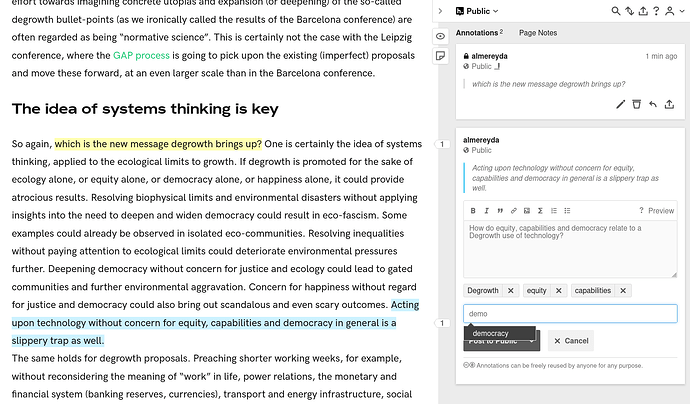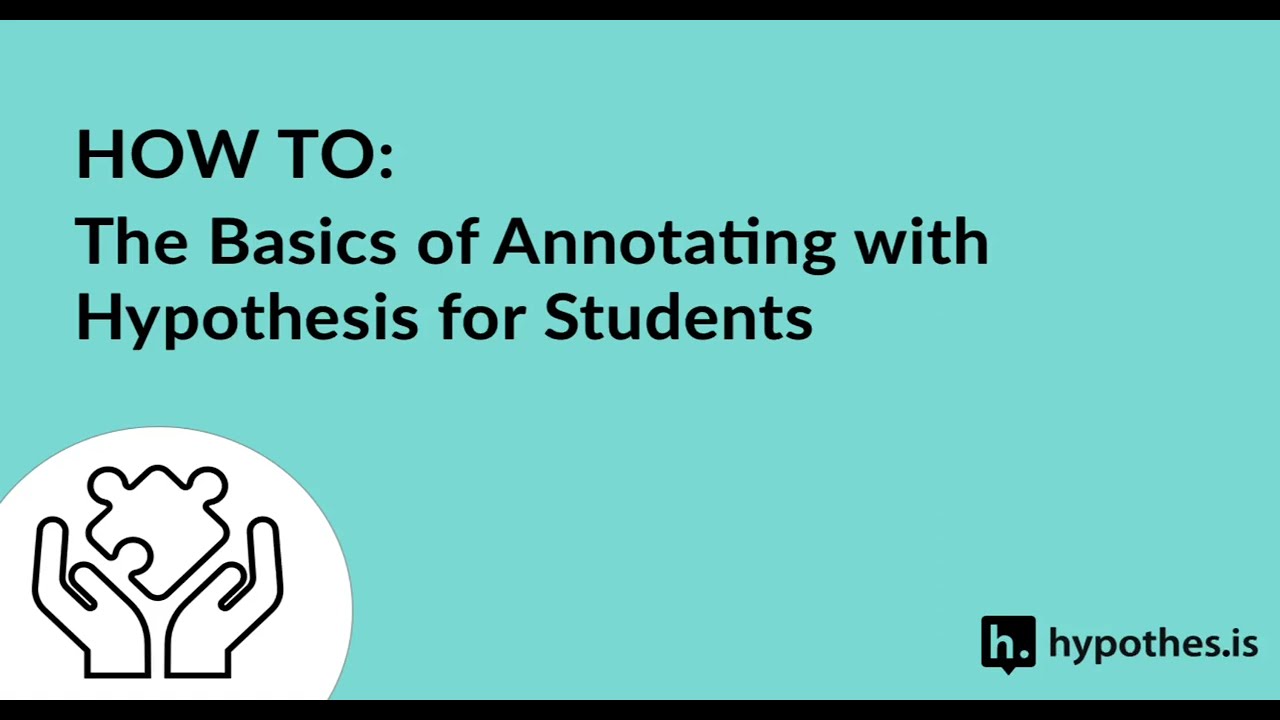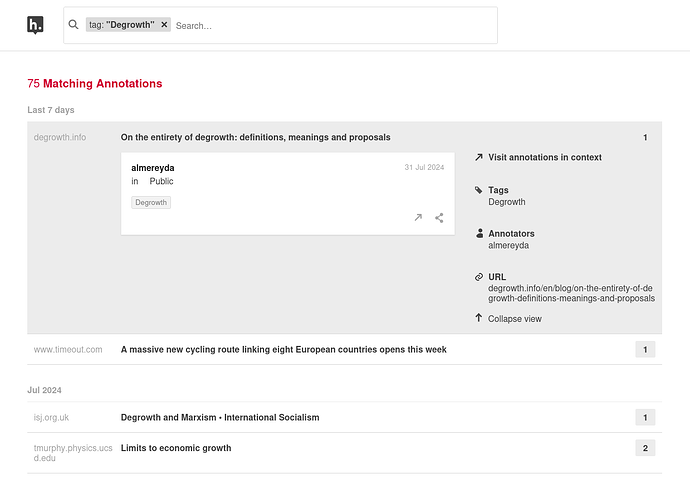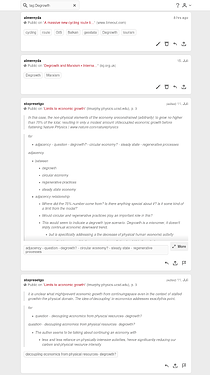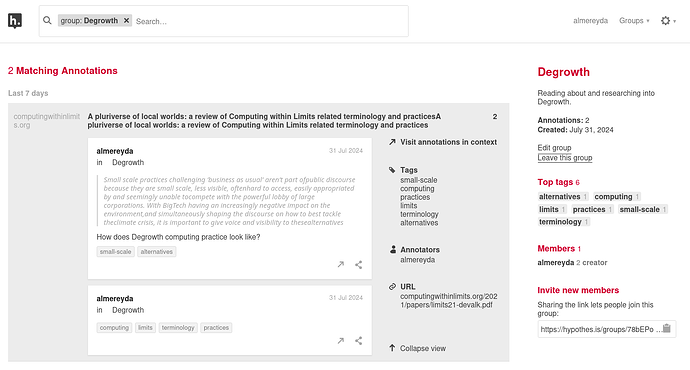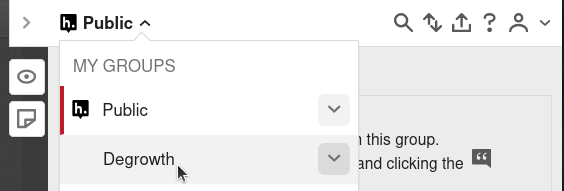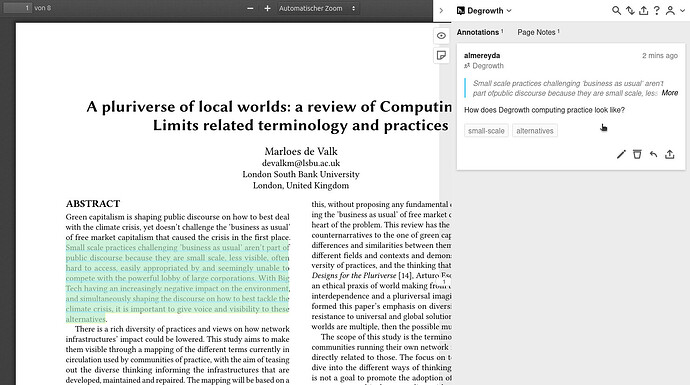Another day a researcher, activist or basically any individual interested in the kaleidoscopic subject of Degrowth will maybe find themselves in the situation of searching and reading texts in the area of interest online. With that comes the question of discoverability and discuss-ability of artifacts.
The reading is most likely happening in a web browser that displays resources on the web, such as web pages or PDF files. It is often a passive undertaking, unless quotes are kept for later and references and links are collected and shared.
The searching will involve electronic interfaces, which provide indexes of references to electronic artifacts to be catalogued and read. The indexes will offer different cataloguing and ordering schemes. Depending on which different query and retrieval strategies apply.
Everything on the web, also understood as « a loosely-coupled system », is addressed by Uniform Resource Locators, the URLs. They specify where a document, file or application can be found.
We can use this property as our primary ordering system for references to resources and this way can make them accessible globally under a unique identifier. Links and URLs are first-class citizens on the web.
Comes the question of finding and enmeshing the webs of links.
Cross referencing two documents by establishing a bi-directional link, indirectly mediated via Hypothesis. via jon ⚝: "Cross referencing two documents by establishing a…" - degrowth.social 🌱
In steps Hypothesis.
What is Hypothesis, the social annotation system?
Remember when reading a book, you often had an idea that you scribbled into the marginalia of a page? Where can this kind of affective interaction happen with digital text? And if already digital and on the web, can we scribble collectively into the marginalia of our web pages and other documents accessible there?
Hypothesis brings
content and conversation together with a layer of social annotation that works across the entire web.
Learn more about the organisation and a collection of case studies.
The application adds a button to the browser, which toggles a sidebar in which written conversations can happen.
The Hypothesis sidebar activated on On the entirety of degrowth: definitions, meanings and proposals | degrowth.info, showing the process of writing an annotation to a selected piece of text, adding tags for improving later retrievability.
The system is well purposed by educational institutions and is also available as an integration to learning management systems (LMS). Here we want to focus on the web browser extension and how to use it to write a social annotation layer about Degrowth on the web.
Setting up an account and the browser extension
- To begin with using the system, one must first create an account at
hypothes.is/signup - Then you need a browser extension, either for
your Chrome
or Firefox.
2.a. Safari users add the link of this Hypothesis Bookmarklet to their bookmark bar.
2.b. Alternative access to Hypothesis is provided with the via.hypothes.is/ service.
You are now ready to create annotations!
Educational material
Check out these how to pages and video to learn more.
Advancing the use of Hypothesis
A social annotation layer on the web shines, when we can easily use it to engage in conversations around articles and also PDF files. To make it easier to find relevant conversations, we need some kind of organisational scheme to carve out our small corner of the web of annotations.
Hypothesis provides two means to publish annotations for dedicated readerships.
- Using tags to add keywords to an article.
- Using a Hypothesis group to privately exchange annotations together.
Let’s have a look at both options.
1. Using tags
Take our earlier web page, for example. It is published on:
In the annotations I have created a so-called Page note as an annotation without selecting any text. In this example I have chosen not to write anything in the comment box, but to supply the Degrowth tag.
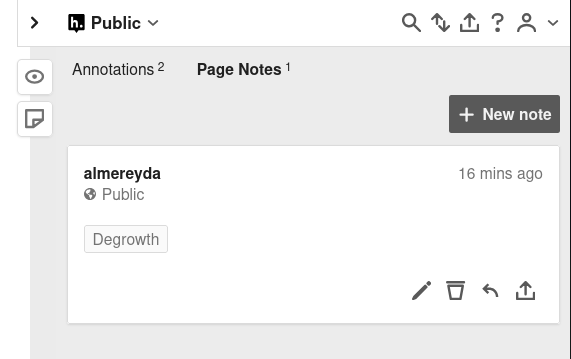
Clicking it sends me to a list of all public annotations that carry the tag Degrowth, including this particular one here.
There is also a more simple view on the stream of annotations for the Degrowth tag:
2. Using a group
There is a semi-private Hypothesis Degrowth reading group at:
You can join it by visiting the link.
Inside the group, we do not strictly need to supply the Degrowth tag, as its meaning would be implicit.
Screenshot of the Degrowth Hypothesis group
It also works on PDFs that are accessible to you via the web. Here as seen on computingwithinlimits.org/2021/papers/limits21-devalk.pdf:
Screenshot of where to select a Hypothesis group for social annotation
Screenshot of an annotation in a PDF
Recapitulation
In this short text we have been shown how to register and setup Hypothesis, where to find learning material, how to use tags to inform others about our finding of a related resource on the web, like pages or PDFs, and how to use a dedicated Hypothesis group for writing together with a specific readership.
By using the Hypothesis browser extension or the Via web services, we can login to the system and share annotations socially with each other. Very much like in the old times of scribbling into the margins of pages.
